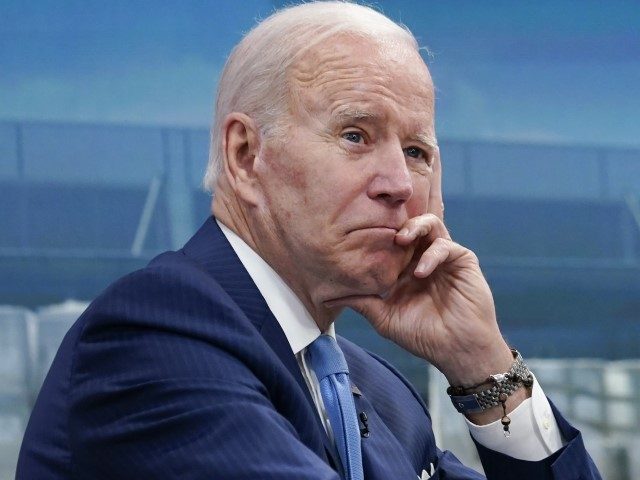A strong majority of Americans believe the U.S. economy is experiencing a recession, a poll from the Economist and YouGov showed.
The results indicate that fifty-five percent of respondents say the U.S. economy is in recession now. Just 21 percent say the economy is not in a recession, and 24 percent say they are not sure.
This is terrible news for Joe Biden, who declared last week that a record high number of Americans were comfortable. His approval ratings have tanked as people have overwhelming rejected the Biden administration’s handling of gas prices, inflation, and the economy. Eighty-three percent of Americans describe the state of the economy as poor or not so good, a separate poll from the Wall Street Journal/Norc showed Monday.
A third poll—this time by ABC/ISPOS—showed that 61 percent of Americans disapprove of Biden’s handling of the economy, 71 percent disapprove of his handling of inflation, and 72 percent disapprove of his handling of gas prices.
The conviction that we are in a recession is widespread. Fifty-six percent of urban and suburban respondents said the economy is in a recession. Fifty-four percent of rural respondents agreed.
The perception that the U.S. is in a recession was strongest in the Northeast, where 60 percent of respondents answered ‘yes’ to the question ‘are we in a recession?’ In the South, it was 55 percent and in the Midwest it was 54 percent. In the West, 52 percent.
Americans with a variety of political views say we are in a recession. Seventy percent of Republicans say this is a recession. So do 58 percent of independents. Even among Democrats, a plurality of 43 percent say we’re in a recession, while 25 percent say they are not sure, and 32 percent deny it.
Fifty-five percent of Hispanic respondents say we’re in a recession. A plurality of 48 percent of blacks say we’re in a recession, with 32 percent unsure and 21 percent saying we are not.
The biggest group saying we are not in a recession is college-educated white men, 37 percent of whom say we are not in a recession. Fifty-one percent say we are. Among white women with college degrees, 54 percent say we are in a recession and 26 percent say we are not.
Among non-college educated white men, 62 percent are yes on recession and 20 percent no. Among their female peers, sixty percent say we are in are in a recession and 12 percent say we are not.
There’s less variation when dividing Americans by income. Among people earning under $50,000 and those earning between $50,000 and $100,000, 56 percent say we’re in a recession. Among those earning more, 54 percent say we’re in a recession.
Divided by age, Americans agree we’re in a recession in every age group, either by outright majorities or a plurality. Among Americans aged 65 and up, 52 percent say we’re in a recession. Between 45 and 64, fifty-six percent say we’re in a recession. Between ages 30 and 44, sixty-one percent say we’re in a recession. Between 18 and 29, a plurality of 49 percent say we’re in a recession, compared with 22 percent who say we’re not and 29 percent who are not sure.
In the U.S., the official arbiters of whether we are in a recession are the members of the NBER Business Cycle Dating Committee. They say that a recession “involves a significant decline in economic activity that is spread across the economy and lasts more than a few months.” Typically, this has been interpreted as two-quarters of negative growth, although the committee declared a recession in 2020 when lockdowns and the pandemic triggered a severe but short-lived contraction. As of the start of June, the committee has not declared that we are in a recession.
The U.S. economy shrank in the first three months of the year at an annual pace of 1.5 percent. Most economists expect the economy will return to growth in the current quarter, although a lot of economic data about April and May has been weaker than expected. The Atlanta Fed’s GDPNow tracker, which estimates GDP growth based on the latest numbers without forecasting unreleased data, indicates just 1.3 percent growth, well below the Blue Chip estimate of around three percent growth. At the end of the last quarter, however, the GDPNow model overestimated growth by 1.1 percentage points.
The poll was conducted between May 28 and May 31, 2022. It included 1500 U.S. adult citizens, including 1280 registered voters. Thirty-two percent of respondents identified as Democrats, 27 percent as Republicans, and 28 percent as independents.

COMMENTS
Please let us know if you're having issues with commenting.